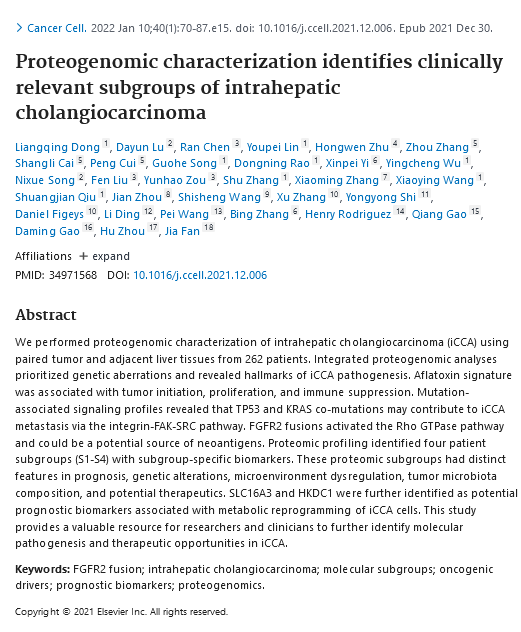23.09.2022
Proteogenomic characterization identifies clinically relevant subgroups of intrahepatic cholangiocarcinoma
Cancer Cell, 2022
Abstract
We performed proteogenomic characterization of intrahepatic cholangiocarcinoma (iCCA) using paired tumor and adjacent liver tissues from 262 patients. Integrated proteogenomic analyses prioritized genetic aberrations and revealed hallmarks of iCCA pathogenesis. Aflatoxin signature was associated with tumor initiation, proliferation, and immune suppression. Mutation-associated signaling profiles revealed that TP53 and KRAS co-mutations may contribute to iCCA metastasis via the integrin-FAK-SRC pathway. FGFR2 fusions activated the Rho GTPase pathway and could be a potential source of neoantigens. Proteomic profiling identified four patient subgroups (S1-S4) with subgroup-specific biomarkers. These proteomic subgroups had distinct features in prognosis, genetic alterations, microenvironment dysregulation, tumor microbiota composition, and potential therapeutics. SLC16A3 and HKDC1 were further identified as potential prognostic biomarkers associated with metabolic reprogramming of iCCA cells. This study provides a valuable resource for researchers and clinicians to further identify molecular pathogenesis and therapeutic opportunities in iCCA.
QuickSwitch Quant tetramer Kits 7300-K1 and 7302-K1 manufactured by our partner MBL International Corporation was used in this study to perform high throughput screening of HLA-A2 and HLA-A24 binding peptides in the proteogenomic characterization of intrahepatic cholangiocarcinoma.


